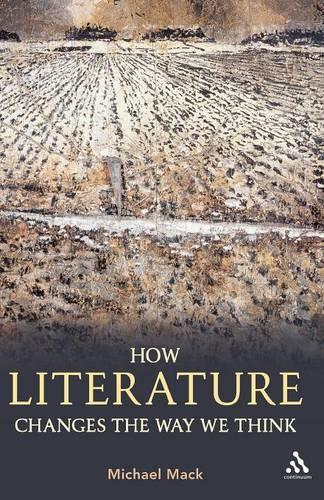
How Literature Changes the Way We Think
(Paperback)
Available Formats
Publishing Details
How Literature Changes the Way We Think
By (Author) Dr Michael Mack
Continuum Publishing Corporation
Continuum Publishing Corporation
2nd February 2012
United States
Classifications
Tertiary Education
Non Fiction
Philosophy
801.3
Physical Properties
Paperback
208
Width 138mm, Height 216mm
268g
Description
The capacity of the arts and the humanities, and of literature in particular, to have a meaningful societal impact has been increasingly undervalued in recent history. Both humanists and scientists have tended to think of the arts as a means to represent the world via imagination. Mack maintains that the arts do not merely describe our world but that they also have the unique and underappreciated power to make us aware of how we can change accustomed forms of perception and action. Mack explores the works of prominent writers and thinkers, including Nietzsche, Foucault, Benjamin, Wilde, Roth, and Zizek, among others, to illustrate how literature interacts with both people and political as well as scientific issues of the real world. By virtue of its distance from the real worldits virtualitythe aesthetic has the capability to help us explore different and so far unthinkable forms of action and thereby to resist the repetition and perpetuation of harmful practices such as stereotyping, stigma, exclusion, and the exertion of violence.
Reviews
Michael Mack supplies an answer to the increased doubts about the role of the humanities. His claim is that literature changes the way we see and act; that it is one of the aspects of our cultural life that shapes who we are on the most elemental level. This confrontation with post-modern theory is part of the newly evolving field of the medical humanities and will be a critical contribution to the debates about how and why we teach literature. * Sander L. Gilman, Distinguished Professor of the Liberal Arts and Sciences, Emory University, USA *
This is a subtle, learned, and at the same time radical investigation of the powers of literature. Dr. Mack challenges us to think afresh. Through his analyses, which range from philosophers such as Spinoza and Benjamin to novelists such as Ishiguru and Doctorow, he demonstrates the new social, ethical and emotional possibilities opened up by the activity of literature. * Dame Gillian Beer, FBA, King Edward VII Professor Emeritus of English Literature and former President of Clare Hall, University of Cambridge, UK *
In providing an ethical response to the issues that face us, Dr. Mack aptly underlines the important contributions that the different university disciplines comprising the humanities may be called upon to make. His brilliant book brings to light the disruptive potential of literature in challenging stereotypical representations of social minorities and also in questioning the typical social models and roles that are most immediately associated with aging and death, with sickness and impurity, and with the biotechnical issues that they involve. * Jeffrey Andrew Barash, Professor of Philosophy, Universit de Picardie Jules Verne, Amiens, France *
Reviewed in the Times Higher Education Supplement.
Everything changes the way we think - it's just that we're not always aware of it. So it's right that Michael Mack, a Reader in English Literature and Medical Humanities at Durham University, should place the emphasis on the 'how' when he argues that literature and the arts and humanities in general can help us 'change harmful practices within politics, religion, medicine and society at large'. According to Mack, who references everything from the TV series Mad Men to the philosophy of Heidegger, art is 'disruptive to the degree of interrupting itself' - thus its power to challenge stereotyping and other potentially harmful habitual behaviour. Which is maybe why many corporations and governments prefer to have it reduced to innocuous, middlebrow pap. Another pineapple juice, anyone * The West Australian *
The book is a major contribution to the field connecting ethics with aesthetics, marking new trends of inquiry. It will definitely be of 3 benefit to thinkers, scholars, and students of literary theory, criticism, philosophy, and cultural theory. * Postgraduate English *
The central thesis of Michael Macks bold and timely defence of the arts and humanities, How Literature Changes the Way We Think, is that literature has a unique and underappreciated capacity to make us aware of how we can change accustomed forms of perception and action (p. 1). Macks apologia for literature is a refreshing alternative to contemporary arguments for the social and political relevance of arts representational work. -- Simon Calder, University of Minnesota * English Studies, Volume 95, Issue 5 *
How Literature Changes the Way We Think comprises interesting, sometimes fascinating inroads toward a diagnosis of the problems of representation, and the effort to describe a theory avoiding these pitfalls seems a helpful project. -- Sean Gerard Ferrier * Contemporary Political Theory *
Author Bio
Michael Mack (PhD. Cambridge) is Reader in English Literature and Medical Humanities at Durham University, UK. Formerly he has been a Visiting Professor at Syracuse University, a Fellow at the University of Sydney, and lecturer and research fellow at the University of Chicago. He is the author of Spinoza and the Specters of Modernity (Continuum, 2010), German Idealism and the Jew (University of Chicago Press, 2003), which was shortlisted for The Koret Jewish Book Award 2004, and Anthropology as Memory (Niemeyer, 2001, Conditio Judaica Series).
